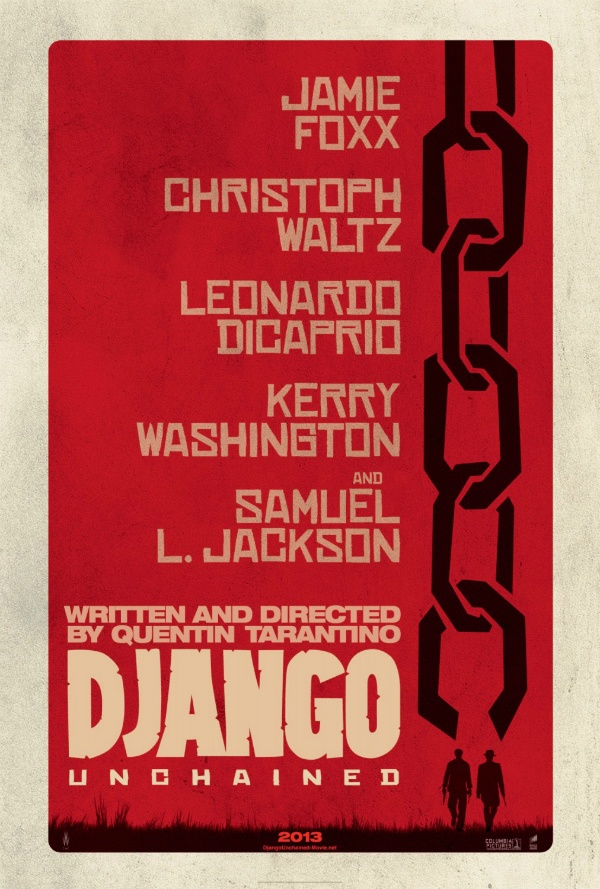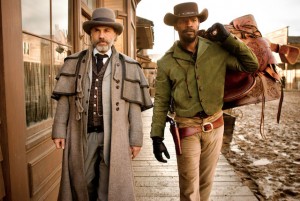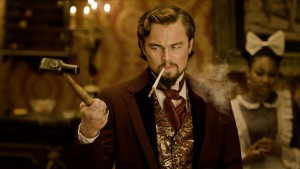The release of a new Quentin Tarantino film is always something of a special event. No matter what else you think about the man or his body of work, one thing can’t be disputed—he eats, sleeps, and breathes cinema, and every frame of every one of his movies is bursting with unbridled affection for the art form. Every scenario, every choice of actor, every music cue, even every character name is informed by the writer-director’s encyclopedic knowledge of, and passionate dedication to, the moving image. That dedication, combined with his penchant for loquacious characters, genre mash-ups, and instant-classic soundtracks, makes the highs of his best films (Pulp Fiction, Kill Bill Vol. 1) seem even higher. Unfortunately, it can make the films that immediately follow them (Jackie Brown, Kill Bill Vol. 2) seem lower by comparison, but these films almost always shine on a second, more considered viewing (with the possible exception of Death Proof, a failed experiment that still manages to be watchable thanks to a few standout performances and, of course, a killer soundtrack). Coming on the heels of perhaps his most accomplished film to date, 2009’s Inglourious Basterds, Django Unchained seems a bit scattershot and ragged around the edges–at least, at first. But QT’s latest (and by far bloodiest) revenge thriller goes down a lot more smoothly a second time.
Two years before the civil war, a slave named Django (Jamie Foxx) is freed from a duo of cruel traders by a German dentist-turned-bounty hunter, Dr. King Schultz (Basterds’ Christoph Waltz, quickly becoming the DeNiro to Tarantino’s Scorsese). Schultz is hot on the trail of a trio of outlaws called the Brittle Brothers, but not knowing what they look like, he needs Django’s help—the Brothers were overseers at the last plantation Django worked on, and he suffered greatly at their hands. If Django can lead Schultz to the Brittle Brothers and help collect the bounty on their heads, Schultz will free Django and help him rescue his wife, Broomhilda (Kerry Washington, currently seen on ABC’s Scandal) from the clutches of sinister plantation owner Calvin Candie (Leonardo DiCaprio). Doing so will require more than a bit of subterfuge, not to mention outsmarting Candie’s loyal manservant, Stephen (Samuel L. Jackson).
The road to Django Unchained’s completion was a bumpy one, with actors like Kevin Costner, Kurt Russell, Sacha Baron Cohen, and Joseph Gordon-Levitt joining the cast and departing it just as quickly (Jonah Hill was in, then out, then back in for what amounts to little more than a glorified cameo). Tarantino was constantly rewriting the script to accommodate the lineup changes, while racing against a locked-in release date of Christmas Day, reportedly trimming away at Django’s initial three-hours-and-change running time right up until the film’s first preview screening (the final movie clocks in at about two hours and forty-five minutes). All this behind-the-scenes chaos may account for the finished product, which somehow feels both too long and not long enough at the same time. Certain characters, like Broomhilda and psychotic Candie henchman Billy Crash (Walton Goggins, terrific here and on FX’s Justified) seem a bit sketched-in, while the trip to, and sojourn at, “Candie Land” seems to go on forever. A scene involving a Klan-like mob, who complain about their hoods obscuring their vision, isn’t funny enough, and it feels like it wandered in from another, sillier movie. For all the talk of the violence in Tarantino’s films, in many cases it usually takes place offscreen, instead choosing to focus on the reasons for it, and the consequences stemming from it. Other times it happens with lightning swiftness, and people are shot to pieces before you know anything has even transpired (the notable exception might be the Kill Bill films, with their epic, expertly-coordinated battle scenes). Maybe that’s why the extended scenes of violence in Django Unchained seem out of place; bodies literally pile up on top of each other during one shootout, and the air is filled with thick, ropy splashes of blood. Whereas the Bride’s showdown with the Crazy 88 in Kill Bill Vol. 1 was a gloriously-choregraphed ballet of bloodshed, its corresponding shootout in Django Unchained is repetitive and numbing.
The things that didn’t work for me marred my overall enjoyment of Django Unchained the first time I watched it, but I saw it again a few days after Christmas and, freed from the weight of unrealistic expectations, I found myself focusing instead on the things that did work. Tarantino’s script suggests that the “flesh for cash” businesses of slavery and bounty hunting are not so different after all, creating an interesting moral crossroads for the slavery-hating Dr. Schultz to navigate (Waltz is cheery and endearingly strange in a role that has just nabbed him an Oscar nomination). Foxx’s Django contains a quiet rage that wouldn’t seem out of place in one of Tarantino’s beloved blaxploitation films, and DiCaprio, with his gnarly teeth and faux-french affectations, functions well far beyond his comfort zone. The real standout performance, though, comes from Samuel L. Jackson; he’s borderline unrecognizable, sporting jowls, a stooped posture, and a receding tuft of snowy white hair. Complex and fiendishly clever, Jackson’s Stephen becomes the movie’s true villain. We’ve become so accustomed to seeing Samuel L. Jackson play some version of Samuel L. Jackson, it’s easy to forget how good he really is at creating a character. The supporting cast is a who’s who of familiar faces—watch for Don Johnson, Bruce Dern, Russ Tamblyn, former Duke Boy Tom Wopat, and in a strange double role, The Warriors’ James Remar (Franco Nero, who starred in an unrelated series of Django films in the 1970s, has a cameo as well). The soundtrack is, of course, stellar, featuring spaghetti western maestros like Ennio Morricone and Luis Bacalov along with anachronistic selections from James Brown, Tupac, Rick Ross, Jim Croce, and John Legend. Even the weakest Quentin Tarantino movie is still likely to be one of the best releases of any given year, thanks to his ongoing love affair with film. And even though some elements of Django Unchained merely graze their intended targets, the cumulative results of Tarantino’s work in crafting this rousing Western (Southern, really, geographically speaking at least) adventure amount to a bullseye.









